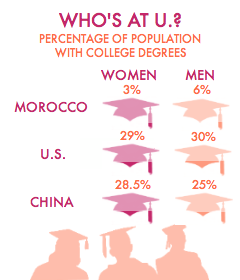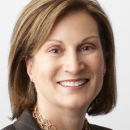
October 22, 2012 | Innovation, Economic Opportunity
Woman of the Week: Connie Duckworth

Woman of the Week Connie Duckworth, Founder and CEO of ARZU, works to increase employment, access to education, and access to basic healthcare for women in Afghanistan. As a “for-benefit” organization, ARZU is a nonprofit organization that uses private sector practices to create jobs and produce high quality products for export in rural villages.
Connie started her career in finance at Goldman, Sachs, & Co., where she was named the first female sales and trading partner in the firm’s history. In addition to serving at Goldman Sachs for twenty years, Connie has served as Chair of the Committee of 200, the organization of leading women entrepreneurs and corporate business executives in the U.S. She currently serves on the boards of Interfaith Youth Core, NorthShort University HealthSystem, Northwestern Mutual Life Insurance Company, Russell Investment Group, and Steelcase, Inc. Author of The Old Girls’ Network: Insider Advice for Women Building Businesses in a Man’s World, Connie uses her background in finance to help and support women entrepreneurs.
A leader in advocacy, social impact, and innovation, Connie shares about the experiences that led to her founding ARZU and her advice to young women.
Why did you decide to focus on ARZU after your long and successful career in finance? Can you describe the process of how you got to where you are now?
Business is a blend of creative problem solving, innovation and pragmatism. It’s not enough to have a good idea; you actually have to execute it. In business, as in life, following the money is a good way to understand human behavior and to discern not only what is going on, but why. Finance and accounting teach you how to do that. Given the particular tool-kit I developed over the course of a long business career, it was a natural extension for me to view potential solutions to social problems through a business lens. I am passionate about women’s rights, especially women’s economic empowerment. Poverty disproportionately impacts women. Founding a social business seemed like a practical way to tackle poverty alleviation.
When I founded ARZU, which means “hope” in Dari, I knew nothing about Afghanistan, traditional international development practices, or rugs. I took the business tool-kit and the network I had built over 25 years and just started. While this may sound simplistic, a willingness to try is key. Like in any for-profit business, ideas are not enough--you have to roll up your sleeves and get the job done. It’s about execution.
What did you study in school?
I have a BA in Plan II. (If you’re not from Texas, you most likely won’t know that it’s the interdisciplinary honors program at University of Texas at Austin). After a junior year in Paris, I was broadly educated in liberal arts. I graduated a semester early from UT to work for a session at the Texas State Legislature, before law school, and that experience was enough to convince me to go to business school. I got an MBA in Finance and Accounting at The Wharton School.
What has been your biggest obstacle along the way? How were you able to overcome it?
With the benefit of perspective and the wisdom of hindsight, I did, at times, take myself too seriously. Developing relationships and building coalitions are the keys to successful endeavors. A little humor can go a long way to breaking down barriers. Avoid hubris. Since there will always be naysayers intent on derailing you, there’s no need to create your own roadblocks.
What do you see as the biggest obstacle to women at the moment?
I am the beneficiary of the women’s movement in the early 1970’s, when women were admitted to colleges and entered the workforce in droves. While recognizing that social change is, by its nature, evolutionary, I am nonetheless astonished that bias towards women continues.
If I could pass one law for women, I would want congressional seats to be apportioned pro-rata based on gender. The entire nature of politics, as we know it, would change. We would all be amazed at what would get done.
Who are some of the people that have inspired you in your career?
When I was younger, I learned from and admired my mentors at Goldman Sachs. Now, I am in awe of this young generation of entrepreneurs. They are smart, innovative, and energetic. It’s exciting to envision how technology can be harnessed for global good.
The Women in the World Foundation recently announced the launch of its new college campus initiative called Women in the World on Campus. Do you have any advice for young women looking to engage with some kind of activist work in their careers?
There is an important calling for each us--some cause that is meaningful to us. Embrace that passion, whatever it is. Activism means engagement, so just start. You’ll learn along the way.
What is the best advice you can give the next generation of women?
Be an optimist. Life “isn’t fair” for anybody, so get over that as quickly as possible. Try your best with whatever you choose to do, fall back and regroup when necessary, but just keep moving. On the personal front, my four kids are my greatest joy and the best thing I’ve ever done. (That’s a hint.)
What do you do to relax? Any guilty pleasures?
I’ve read 22 mystery novels set in Victorian England since June…